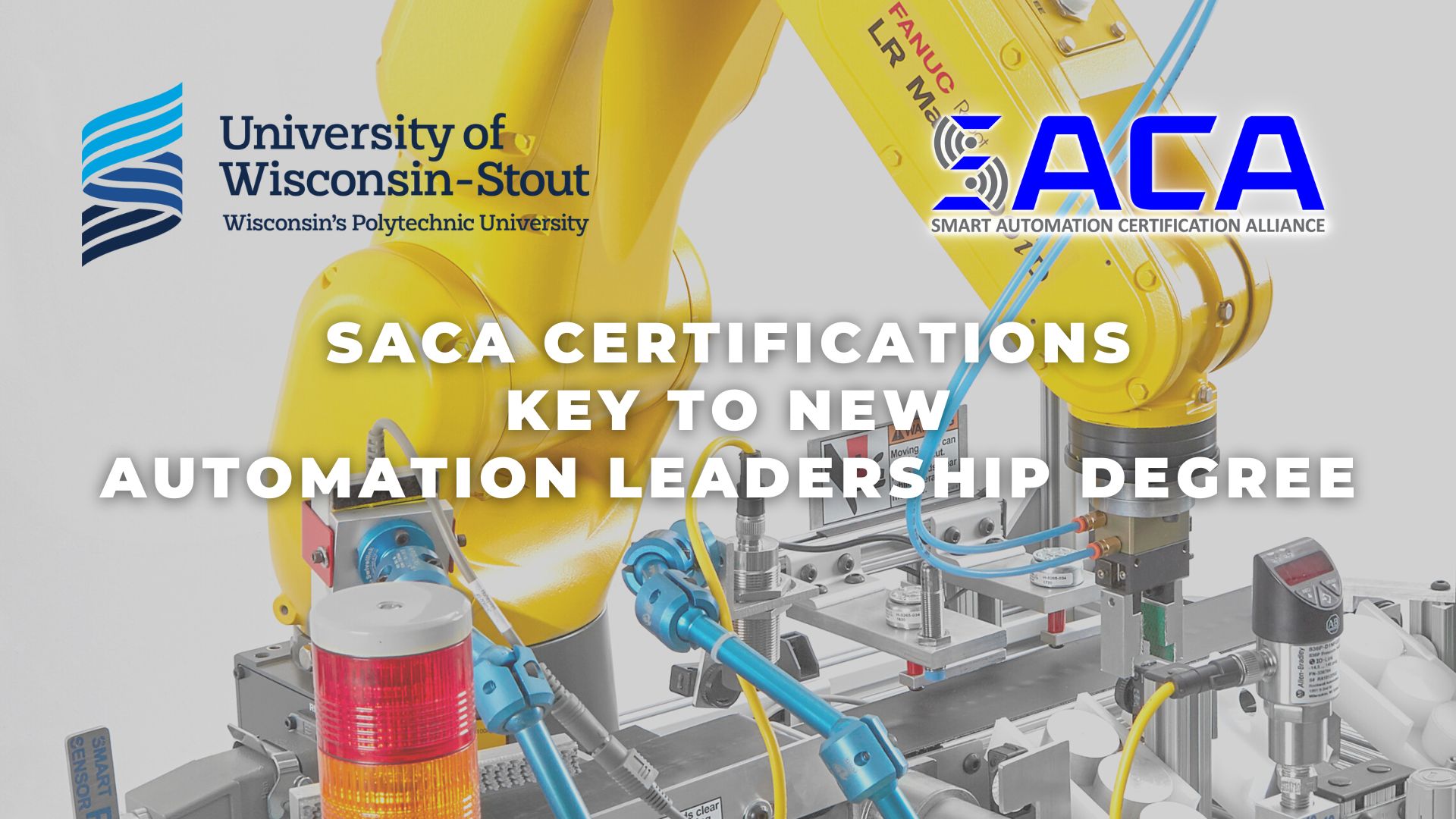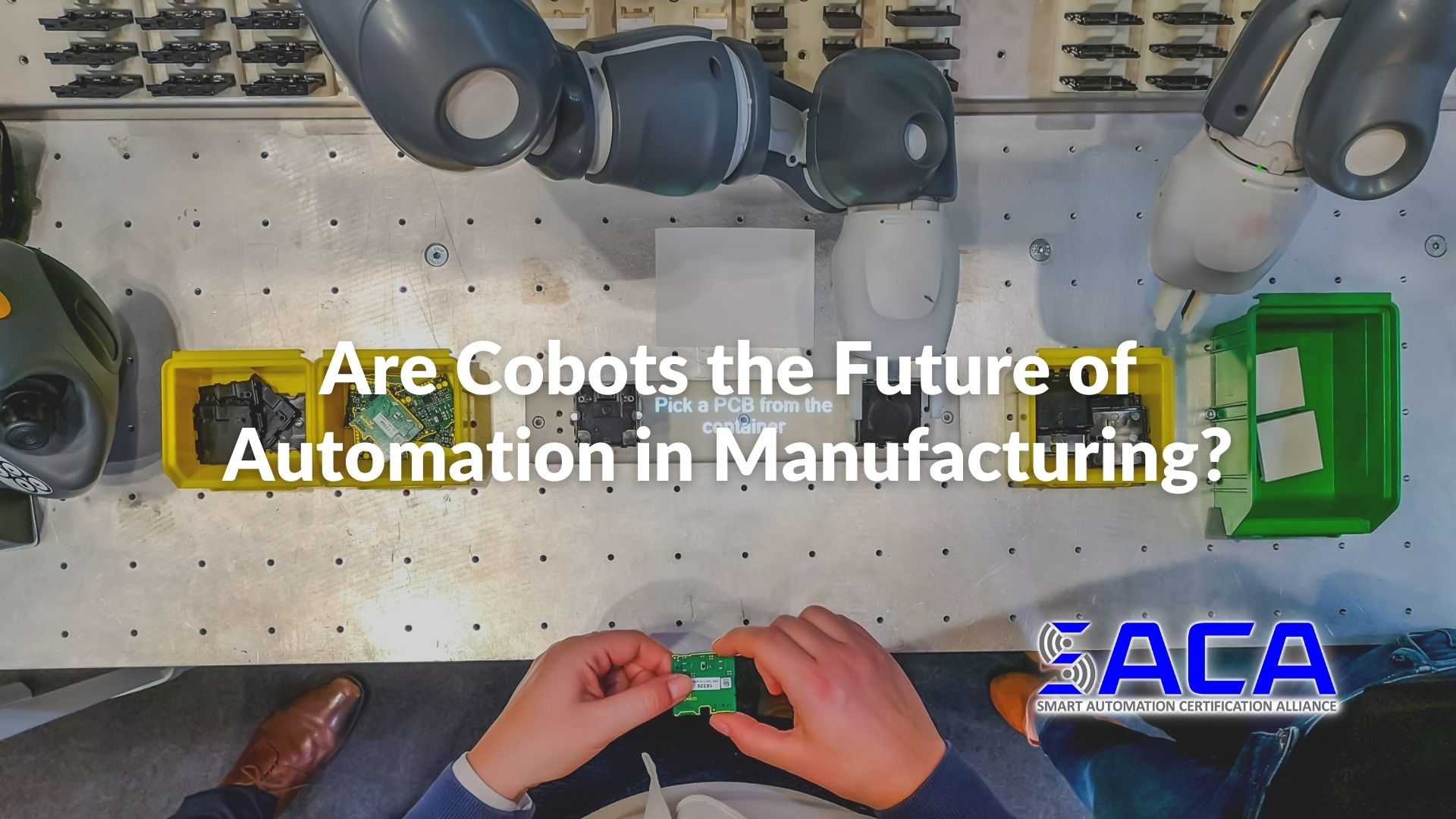SACA Certifications Key to New Automation Leadership Degree
The Smart Automation Certification Alliance (SACA) is pleased to announce that its certifications will play a key role in students pursuing a first-of-its-kind Automation Leadership degree at the University of Wisconsin-Stout.
On June 9, 2023, the UW System Board of Regents approved a new B.S. Automation Leadership degree at UW-Stout for enrollment this fall. As the university noted in its press release:
“The online program is designed for technical and community college students who have an associate degree and incorporates training in SACA…Students also can begin their career path in high school while taking college credits or, if working in industry, return to school as adult learners to finish their degree.”
SACA Executive Director Jim Wall is excited for students and workers who now have a new path to turn their SACA credentials into a bachelor’s degree. “It’s unprecedented that a university system would recognize a credentialing agency at this level,” noted Wall.
According to UW-Stout, “[o]ffering courses aligned with [SACA] standards, [the] Automation Leadership degree offers the relevant leadership and management training to enhance your industry-recognized credentials…[and] can be completed entirely online.”
SACA board member Matt Kirchner notes that “[t]he integration of industry-backed stackable credentials from the Smart Automation Certification Alliance, the alliances with technical colleges and the hands-on nature of the degree are unmatched.”
Kirchner, who also has 20 years of experience as an advanced manufacturing CEO and is currently president of ATS/LAB Midwest, a leading distributor of technical education learning materials, was instrumental in bringing industry experts into the process of developing both SACA credentials and the new Automation Leadership degree.
“We consult with advanced manufacturing employers in Wisconsin and throughout the Midwest – from smaller contract manufacturers to the Fortune 500,” Kirchner said. “Almost all of them tell us one of their greatest needs is for team members who understand automation, Industry 4.0, advanced control systems and process optimization and who can integrate highly advanced industrial technology and help lead a company’s digital transformation. People with these skills are in unbelievably high demand. This degree hits the mark with precision and does so in a genuinely innovative fashion.”
A wide variety of Wisconsin manufacturers assisted during the program’s development, including “Harley-Davidson, Kohler, Mercury Marine, Oshkosh Corp., Ashley Furniture, Generac, Greenheck Group and Plexus, as well as many medium and small manufacturers.”
About SACA
SACA sits at the forefront of the effort to certify students and workers who demonstrate the required knowledge and hands-on smart automation skills employers so desperately need. SACA’s certifications were developed in conjunction with industry partners who could speak from experience about their needs when it comes to workers able to work alongside a variety of advanced automation technologies.
SACA offers a wide variety of certifications in popular industrial skill areas, including certifications at the Associate, Specialist, and Professional level. For those wishing to focus on building a strong foundation of skills employers need, SACA also offers many micro-credentials that allow students and workers to add certifications as they master new areas.
For workers, SACA certifications can help market their smart automation skills to potential employers. For those employers, SACA certifications represent confirmation that a worker has the skills to hit the ground running in the workplace. To learn more about Industry 4.0 certifications and how SACA can help both future workers and industrial employers begin the task of bridging the Industry 4.0 skills gap, contact SACA for more information.
- Published in News
Certifications Facilitate Skills-Based Hiring
It’s no secret that industries around the world continue to struggle to fill open positions. Despite the ongoing recovery from the COVID-19 pandemic, industries such as manufacturing still need more highly-skilled workers than they can find.
What’s going on? Experts point to the ongoing “skills gap” issue that has plagued industries for years now. With the implementation of a wide variety of new advanced automation technologies, industry needs workers with more advanced technical skills than ever before. But where are they?
The supply of such workers continues to lag far behind demand, creating the shortages we’re seeing today. To combat these issues, many industries are making bold moves to find a solution. One trend gaining momentum is a new focus on skills-based hiring, which has led many employers to ditch advanced degree requirements in favor of searching for workers with the particular skills they need.
A switch to a skills-based hiring model isn’t necessarily intuitive for many industries that have always relied upon traditional four-year-degree requirements as a proxy for qualified applicants. Those making the switch, however, have found an easy way to help find workers with the skills they need: industry-standard certifications.
In this article, we’ll take a closer look at the move toward skills-based hiring. We’ll also dive into how industry-standard certifications make it easier for employers to feel confident that the workers they’re hiring have the skills they need to hit the ground running. Finally, we’ll explain how the Smart Automation Certification Alliance (SACA) has assembled a comprehensive set of industry-standard certifications and micro-credentials that can help any employer hire workers with the advanced technical skills they’ll need to thrive in the modern industrial workplace.
The Move to Skills-Based Hiring
For years, secondary schools have pushed students toward traditional four-year degrees. Why? That’s what employers have traditionally required to get hired. If you looked at job listings before the pandemic hit, you’d see listing after listing that included a requirement of some type of four-year degree.
Today, however, the hiring landscape is slowly changing. The number of open positions and the lack of highly-skilled workers to fill them have forced industries across the country to reevaluate their hiring practices.
According to a ComputerWorld article, many employers are finally realizing their degree requirements have been hindering their hiring efforts. The article notes:
“Among middle-skilled occupations, the openings that require college degrees are, for the most part, similar to those openings for which no degree is required, according to a recent study by Harvard Business School’s (HBS) Project on Managing the Future of Work and the Burning Glass Institute. ‘Jobs do not require four-year college degrees. Employers do,’ the study said. That realization is prompting companies to consider a shift in hiring practices that recognizes the nontraditional paths many have taken to develop technology skills — paths that don’t require a degree.”
The article also notes that the shift to skills-based hiring has begun to take off in the information technology sector: “with a 2% unemployment rate, the tech industry is rethinking what job applicants need to get hired. Skills-based hiring is on the rise, and 59% of employers are considering eliminating college degree requirements — changes that could reshape the IT workforce.”
What about the world beyond IT? According to a Harvard Business Review article, “employers are indeed resetting degree requirements in a wide variety of roles. The change is most noticeable for middle-skill positions — defined as those requiring some post-secondary education or training but less than a four-year degree.”
The Harvard Business Review article concludes: “[i]n evaluating job applicants, employers are suspending the use of degree completion as a proxy and instead now favor hiring on the basis of demonstrated skills and competencies. This shift to skills-based hiring will open opportunities to a large population of potential employees who in recent years have often been excluded from consideration because of degree inflation.”
The Role of Certifications in Skills-Based Hiring
If you’re a human resources professional, the obvious question you might be asking is: “how can I ensure candidates possess the skills needed if they don’t have a four-year degree?” This is a valid question, because most employers aren’t necessarily equipped to assess a candidate’s skill levels on their own.

If only there was a way for candidates to prove to prospective employers that they have the skills needed to be successful. We’re joking, of course, because candidates have been using industry-standard certifications to do exactly that for years now.
A wide variety of industry-standard certifications exist that certify that prospective workers possess the knowledge and, in many cases, proven hands-on skills in a particular area. Certifications come in many shapes and sizes, from micro-credentials that certify expertise in a narrow subject-matter area to more robust certifications that encompass a wide range of skills, such as all the necessary skills involved in industrial maintenance.
As skills-based hiring becomes more popular, it will be necessary for employers to become more familiar with the variety of certifications and credentials available to evidence the skills they seek. It will also be critical for educators and industries to work together to promote and encourage alternative credentialing.
A Deloitte report echoes this need:
“Alternative credentialing can encourage reskilling amid rapidly evolving technology. The shrinking shelf-life of digital skills requires continuous reskilling. Employers desire tracking and verification of those skills. As a result, the job market increasingly calls on training providers and academic institutions to offer “credentialized” records of learning and mastery. Rather than relying heavily on two- and four-year degrees, skill-specific microcredentials, digital badges, or certificates specify the exact technologies an applicant has mastered. This simplifies career shifts and employee selection, making labor markets more efficient.”
Fortunately, many economic and workforce development organizations around the country are already focusing more on certifications. According to the National Conference of State Legislatures, “[t]o better their workforces and provide additional economic opportunities to those who need it most, many states have put a focus on expanding postsecondary options for adult learners. These opportunities range from promoting career and technical education to expanding nondegree credentialing options.”
How SACA Certifications Facilitate Skills-Based Hiring
For companies looking for highly-skilled individuals to fill open positions, a good place to start is searching for prospective workers with certifications or micro-credentials from the Smart Automation Certification Alliance. SACA sits at the forefront of the effort to certify students and workers who demonstrate the required knowledge and hands-on smart automation skills employers so desperately need.
SACA’s certifications were developed in conjunction with industry partners who could speak from experience about their needs when it comes to workers able to work alongside a variety of advanced automation technologies. For example, SACA offers certifications in many key areas for a variety of industries, including basic to advanced operations; robot systems; and IIoT, networking, and data analytics.
SACA also offers specialist certifications, as well as micro-credentials, related to a variety of in-demand skills for systems such as automation, electrical, mechanical, fluid power, controls, and instrumentation. SACA’s certifications come in two forms: silver certifications are earned upon passing a knowledge exam and gold certifications are earned upon passing a hands-on skills test.
For workers, SACA certifications can help market their smart automation skills to potential employers. For those employers, SACA certifications represent confirmation that a worker has the skills to hit the ground running in the workplace.
To learn more about Industry 4.0 certifications and how SACA can help both future workers and industrial employers begin the task of bridging the Industry 4.0 skills gap, contact SACA for more information.
About Duane Bolin
Duane Bolin is a former curriculum developer and education specialist. He is currently a Marketing Content Developer for Amatrol, Inc. Learn more about Amatrol and its technical training solutions, including eLearning, here and connect with Duane on Amatrol’s Twitter, Facebook, LinkedIn, and YouTube pages.
- Published in News, Technology
“SACA Has Provided Me With Critical Skills”: A Conversation with Alex Topalovic
Alex Topalovic, a Project Manager at northern Indiana-based enFocus and recent Conexus Rising 30 award recipient, completed SACA C-101 and C-102 certifications in the spring of 2022 at the Ivy Tech -Elkhart/South Bend campus. We sat down with him to discuss why he chose to pursue SACA certifications and how he believes they’ve strengthened his understanding of advanced manufacturing and logistics (AML).
Topalovic is a native of Belgrade-Serbia, studied Global Management (‘19) at Earlham College in Richmond, Indiana, and then received a master’s degree from the Massachusetts Institute of Technology (MIT). Topalovic also completed internships at the Richmond Baking Company and Fiat Chrysler Automobiles, competed in supply chain competitions at ASCM Deloitte and Conexus Rolls-Royce, and co-founded Digital Leader, an IT startup / platform that helps high school teachers develop digital leadership and technology skills among their students.
Topalovic is also a recent winner of the Conexus Rising 30 award given to people under 30 years of age that are “bringing exceptional leadership and innovative thinking to bear on [advanced manufacturing and logistics] toughest challenges.” Conexus Indiana is a non-profit initiative that facilitates industry, academic, and public sector partnerships to position “the Hoosier State as the best place for advanced manufacturing and logistics industries to innovate, invest, employ and succeed.” Of the award, Topalovic said, “Conexus has allowed me to make several connections in the state and work to further bettering Indiana’s manufacturing industries.”
Currently working as a Project Manager at enFocus, Topalovic has been praised for playing a key role in actionable process improvements to “sharpen supply chain, manufacturing, R&D, and market access,” including the deployment of Transformation XP, which “helps companies improve on-time delivery, reduce stock outages, increase revenue, and improve customer satisfaction.”
“I work for enFocus because there are many opportunities in AML in the state of Indiana,” says Topalovic, “so I help with talent development and recruitment to the state. Working with organizations like the University of Notre Dame and the Eli Lilly Endowment, Inc., we create innovative research projects to attract and retain talent in South Bend area.” Specifically, in regards to Notre Dame, Topalovic works with iNDustry Labs, the university’s platform for collaborating with local industry.
SACA Certifications
Manufacturers looking to improve efficiency and increase productivity are increasingly looking to advanced Industry 4.0 technologies to automate their operations and processes. Technologies like artificial intelligence are transforming modern manufacturing facilities, but their adoption is not without hurdles.
In the spring of 2022, Topalovic completed Gold Certifications in C-101 (March 23,2022) and C-102 (May 17, 2022) within the Ivy Tech’s Smart Manufacturing and Digital Integration program. Topalovic says that his past experience with Rolls Royce and Deloitte Fiat prompted him to attain SACA certifications so that he could better understand the concepts and skills outlined in the C-101 and C-102 Credentials.
“SACA has provided me with critical skills through hands-on training, curriculum, and multimedia. I like the Silver and Gold certifications and the clear pathways through the program to achieve industry specific skills,” says Topalovic. Further, he said, “I like how the clear understanding of certification hierarchy levels, hands-on training skills, and curriculum follow the course well.”
Not only was Topalovic satisfied with his SACA experience, but he’s also said that he’s looking forward to attaining higher level SACA credentials in the future and has recommended SACA certifications. “I see several other businesses using SACA certifications. I have recommended these certifications to several co-workers.”
Topalovic particularly praised the Gold-level SACA certifications, which reinforce skills with hands-on practice and ensure that people can demonstrate practical application of the skills that they have learned: “Amatrol training equipment and materials helped with understanding course content. The equipment provided by Amatrol in Ivy Tech Training facility was of high quality and amazing how it was able to teach all the course concepts. This differs from other certifications I have taken in the past which do not have equipment to supplement course content.”
Overall, Topalovic not only has an optimistic outlook on SACA Certifications and their application, but the future of AML in the state of Indiana as a whole:
“Indiana’s business friendly practices coupled with strong emphasis from government leadership and organizations including Conexus to promote Advancing AML have led to Indiana being one of the leading manufacturing states. Indiana is a great state with great culture. The people work extremely hard and the industries surrounding Northern Indiana provide many opportunities for professionals to Advance their career in AML. Manufacturing is vital to Indiana’s economy and ranks as one of the top states in nation in relation to the percentage of state GDP. I am very proud to be a part of this!”
To learn more about SACA, please download our brochure or read an interview with our Executive Director, Jim Wall.
- Published in News, Technology
Artificial Intelligence Transforming Modern Manufacturing
How intelligent are modern manufacturers? According to Albert Einstein, “the measure of intelligence is the ability to change.” By this standard, today’s ever-changing manufacturers are very intelligent indeed.
Most manufacturers will tell you that the one constant they can count on is change. It sounds ironic, but manufacturers know that they must be constantly innovating if they’re going to continue to improve productivity and efficiency.
For many manufacturers, the incorporation of various forms of advanced Industry 4.0 technologies has allowed them to meet new challenges and thrive during an extended period of difficult times caused by pandemic disruptions, supply chain issues, and inflationary pressures.
In this article, we’ll take a closer look at one of those advanced Industry 4.0 technologies — artificial intelligence (AI) — that is revolutionizing the industrial workplace. We’ll also discuss how SACA certifications can ensure that your workers possess the advanced skills they need to succeed in today’s evolving manufacturing sector.
What is Artificial Intelligence?
What do you think of when you hear the phrase “artificial intelligence?” For some, images of sentient robots straight out of a science-fiction movie may jump to mind. Is this what we’re talking about when we discuss AI in the context of modern manufacturing? Of course not!
While robots certainly occupy an important and increasing role in manufacturing facilities around the world, AI is all about computers and data. According to IBM, “[a]t its simplest form, artificial intelligence is a field, which combines computer science and robust datasets, to enable problem-solving. It also encompasses sub-fields of machine learning and deep learning…These disciplines are comprised of AI algorithms which seek to create expert systems which make predictions or classifications based on input data.”
What does AI mean in a practical sense? According to Oracle, “artificial intelligence refers to systems or machines that mimic human intelligence to perform tasks and can iteratively improve themselves based on the information they collect.”
Oracle sums up AI this way:
“AI is much more about the process and the capability for superpowered thinking and data analysis than it is about any particular format or function. Although AI brings up images of high-functioning, human-like robots taking over the world, AI isn’t intended to replace humans. It’s intended to significantly enhance human capabilities and contributions. That makes it a very valuable business asset.”
How Can Artificial Intelligence Improve Workplace Safety?
So how is AI being incorporated into modern manufacturing operations? One area in which AI is playing an increasingly important role happens to be one of the most important considerations in any manufacturing facility: safety.
According to a recent Industry Today article by Rob Schoenthaler, “[i]ncreasing worker safety has become a huge priority to the workplace…As a result, spending on safer equipment became a top priority for companies half a century ago and still continues to this day. Nearly every profession has adopted this principle of prioritizing safety, especially fields that yield higher risks for employees, such as construction and manufacturing.”
Schoenthaler notes that the repetitive nature of the physical labor involved in manufacturing helps employers to identify safety risks. However, he points out that most current safety programs are reactive in nature, intended to minimize injuries when a dangerous situation occurs.
While these safety measures offer some improvement over the dangerous conditions that have existed for years, Schoenthaler argues that “a proactive approach is imperative to prevent these unfortunate situations from happening in the first place.” That’s where AI comes into play.
Schoenthaler explains that “new innovations in manufacturing technology have allowed artificial intelligence to use continuous monitoring of work activity to detect a potential accident before it occurs. AI can now analyze videos filmed by cameras all around the factory floor to detect potential employee safety violations and proactively warn the worker of the danger. For example, if the camera spots an employee wearing the wrong protection equipment or positioned too close to a hazardous vehicle, it will contextualize this data and alert the company so they are aware of the safety hazard.”
For manufacturers, using AI proactively in this way “can significantly reduce safety risks in the workplace.” Indeed, “the technological innovations of AI have proven to be a promising solution for increasing workplace safety, and will be for years to come.”
Of course, “[m]anaging the switch to AI will require employees to be well-trained on new operating procedures and best practices.” Like similar new Industry 4.0 technologies, AI will require highly-skilled workers trained to work with these new technologies to fully reap the benefits.
Supply Chain Woes? Artificial Intelligence to the Rescue!
Does AI offer benefits in areas other than safety? Absolutely! In a recent Industry Today article by John Dwinell, the author details how AI can be used to improve operations and enhance inventory visibility in warehouses and other key components of the supply chain.
Dwinell summarizes the supply chain problems plaguing operations across the country: “Warehouses are buckling beneath the pressure of demand, as e-commerce volumes continue to rise and global supply chains remain in gridlock. Inventory needs to be shipped, and fast, but labor shortages are directly impacting distribution centers.”
He acknowledges that “automation technologies have gained momentum with the rise of robotic systems capable of moving and sorting inventory.” However, he notes that “inventory visibility has been largely left out of the conversation. This has placed warehouse operators in the dark when it comes to critical data, such as product quality assurance and the health of sorting systems.”
That’s where AI paired with image recognition technology makes a critical difference. “When captured and analyzed effectively, data can be a game changer for streamlining operations. Specifically, understanding the quality of inventory and gaining traceability to know where everything is in real time.”
Dwinell explains how these technologies work together “to gain complete inventory visibility and enhance automation and throughput”:
“If a picture is worth a thousand words, then an image captured within the warehouse is worth a thousand data points. Photos reveal, in real time, the condition of inventory when it arrives by sharing information about all six sides of a package, providing a holistic understanding of quality. Images…are then stored, generally via the cloud, to build a catalog of products. This creates an immense amount of valuable data.”
Dwinell adds that “[b]ecause AI is capable of learning, AI models that are trained well will be able to identify the source of many common problems. One of the biggest advantages of utilizing AI in this capacity is that it does not require coding knowledge to operate, nor assistance from data scientists for model creation. And there’s an added plus: AI can often be integrated with existing warehouse technology, creating a fully automated workflow.”
This is why Dwinell believes that “[a]rtificial intelligence is no longer a ‘nice to have,’ it’s a need to have…image recognition and AI can be the ‘light switch’ that provides visibility into the once-dark distribution lifecycle. Together, image recognition and AI eliminate guesswork, enable greater visibility, and provide automation that will be the deciding factor in which companies can deliver on their promises to customers.”
SACA Certifications Can Ensure Workers Possess the Skills You Need
Manufacturers looking to improve efficiency and increase productivity are increasingly looking to advanced Industry 4.0 technologies to automate their operations and processes. Technologies like artificial intelligence are transforming modern manufacturing facilities, but their adoption is not without hurdles.
Incorporating these new advanced technologies requires hiring workers with Industry 4.0 skills or training current workers to operate, maintain, troubleshoot, and repair these new systems. Unfortunately, these workers remain in short supply in today’s tight job market.
How can manufacturers ensure that they hire or train people with the advanced skills they need in a modern smart factory environment? Fortunately, they don’t have to figure everything out by themselves. The Smart Automation Certification Alliance (SACA) sits at the forefront of the effort to certify students and workers who demonstrate the required knowledge and hands-on smart automation skills employers so desperately need, including artificial intelligence.
SACA’s certifications were developed in conjunction with industry partners who could speak from experience about their needs when it comes to workers able to work alongside a variety of advanced automation technologies. For example, SACA offers a Certified Industry 4.0 IT Systems Specialist certification that prepares individuals to succeed in information technology technician and engineering positions in modern production environments that use Industry 4.0 technologies.
This certification features a variety of elective micro-credentials that are ideal for individuals seeking to become versed in Industry 4.0 automation, such as: robot system operations and integration; programmable controller systems; industrial Ethernet communications; smart sensors; SCADA systems; Industry 4.0 data analytics; and industrial network security systems.
For workers, SACA certifications can help market their smart automation skills to potential employers. For those employers, SACA certifications represent confirmation that a worker has the skills to hit the ground running in the workplace. To learn more about Industry 4.0 certifications and how SACA can help both future workers and industrial employers begin the task of bridging the Industry 4.0 skills gap, contact SACA for more information.
- Published in News, Technology
SACA Certifications Approved as Industry Based Certifications for Texas High Schools
The Smart Automation Certification Alliance (SACA) is proud to announce the inclusion of SACA certifications on the latest Texas Education Agency’s (TEA) list of approved Industry Based Certifications (IBC). This will allow access for students at Texas’ 3,000+ high schools to become certified in cutting-edge Industry 4.0 competencies and prepare them for jobs in rapidly changing industrial environments. This will aid both the Texas workforce and industry in closing the skills gap that currently exists worldwide as Industrial Internet of Things (IIoT) technology continues to be adopted.
The adoption of new IBCs by the TEA is a bi-annual process and certifications must pass a rigid vetting process based around six criteria to make certain that certifications prepare students for in-demand jobs within the current workforce. The TEA ensures the relevance of these certifications by soliciting feedback from industry councils and employers. The inclusion of SACA certification will allow students to enroll in SACA-aligned programs, which will aid school districts by receiving additional funding for students who attain SACA certifications.
The TEA-approved SACA certifications include:
- Certified Industry 4.0 Associate – Basic Operations (C-101)
- Certified Industry 4.0 Associate – Robot System Operations (C-103)
- Certified Industry 4.0 Automation Systems Specialist I – Electrical Systems 1 (C-201)
- Certified Industry 4.0 Automation Systems Specialist I – Electric Motor Control Systems 1 (C-202)
- Certified Industry 4.0 Automation Systems Specialist I – Motor Control Troubleshooting 1 (C-204)
- Certified Industry 4.0 Automation Systems Specialist I – Programmable Controller Troubleshooting 1 (C-208)
- Certified Industry 4.0 Automation Systems Specialist I – Robotic Operations 1 (C-215)
- Certified Industry 4.0 Automation Systems Specialist I – Robotic System Integration 1 (C-216)
About SACA
The Smart Automation Certification Alliance (SACA) is a non-profit organization whose mission is to develop and deploy modular Industry 4.0 certifications for a wide range of industries. With the help our partners, SACA has created certifications that are industry-driven, developed for industry by industry. They are developed through a rigorous process that begins with the creation of truly international skill standards, endorsed by leading experts in Industry 4.0 technologies throughout the world.
- Published in News, Technology
Industry 4.0 Creates Need for IT & Cybersecurity Experts
The challenges facing industries across the country and around the world continue in the ongoing wake of the COVID-19 pandemic. When you add staggering inflation to supply chain disruptions, it’s no wonder companies everywhere are searching for ways to increase productivity and efficiency.
One of the primary solutions many companies are embracing is a range of advanced automation technologies collectively known as the Industrial Internet of Things (IIoT) or Industry 4.0. The shift to connected-systems technologies began well before the pandemic, but the effects of the pandemic have greatly increased the adoption rate of Industry 4.0 technologies.
Whether it’s adding robots, autonomous mobile robots (AMRs), or sensors to machines, Industry 4.0 technologies are gaining ground and making a difference. However, adoption of these new solutions can also create an entirely new set of needs that companies must address.
In this article, we’ll take a brief look at how Industry 4.0 technologies create a need for specialized IT and cybersecurity experts to oversee and manage these new solutions. We’ll also explain how the Smart Automation Certification Alliance (SACA) can help companies find the right experts with the advanced Industry 4.0 skills they need to take their businesses to the next level.
Looking to Industry 4.0 for Solutions
Regardless of your industry or the size of your company, no one has been immune from the continuing effects of the COVID-19 pandemic and the subsequent supply chain issues and rising costs associated with inflation. For many companies, it seems like it’s simply one thing after another with a new challenge arising every day.
To combat these problems, companies everywhere are searching for solutions that allow them to increase productivity and efficiency even in the midst of an extremely tight labor market. As a recent Automation.com article by Henry Martel points out, “an increasing number of [manufacturers] are embracing Industry 4.0 to bolster enterprise efficiency by making their manufacturing more aware, predictive, and autonomous.”
But what does embracing Industry 4.0 really mean, in a practical sense? Martel breaks it down for us in his article:
“The shift from Industry 3.0 to Industry 4.0 involves the convergence between information technology (IT) and operational technology (OT). Connecting OT systems to an IT network allows a more detailed view of individual equipment and creates a comprehensive view of the entire ecosystem, simplifying management and operation. Besides allowing machines to be largely operated autonomously without human supervision, Industry 4.0 creates higher value when data collected from intelligent sensors and actuators connected to equipment leads to better decision making, as well as to the ‘learning’ that’s now possible with artificial intelligence (AI) and machine learning (ML).”
For example, Martel explains that “analyzing big data collected from sensors on the factory floor provides real-time visibility of manufacturing assets to facilitate predictive maintenance in order to minimize costly downtime. In this instance, machine learning algorithms detect and target faulty parts before they wear out, rather than wait until repair work is more expensive.”
In addition to machine learning, Industry 4.0 takes advantage of artificial intelligence “to analyze sensor data to track equipment usage, improve workflows, streamline logistics, increase safety, and achieve higher overall efficiency across OT and IT operations.” In this way, “Industry 4.0 unlocks actionable data throughout the plant and beyond, improving operational awareness in manufacturing and maintenance processes.”
The benefits of these new advanced automation technologies are clear, and early adopters are seeing huge gains in both efficiency and productivity. However, these Industry 4.0 technologies do create a new need for companies: IT and cybersecurity experts that can operate, program, maintain, troubleshoot, and repair these intricate and complex systems that generate enormous amounts of data.
The Need for IT & Cybersecurity Experts
A recent Embedded article by Johan Kraft paints a clear picture of the IT and security needs created by these new “immensely complex” IIoT systems. As Kraft notes, “[o]ne of the defining features of Industry 4.0 is distributed sensing. This latest iteration of industrial automation sees a dramatic increase in the sensor nodes used to monitor equipment and processes, all linked up to gateway devices in a complex industrial internet of things (IIoT)…But this also requires more focus on the security of the network to ensure safe operation.”
Why is security such a critical issue with Industry 4.0 systems? Kraft explains: “Most industrial systems have been isolated in closed loop systems. Industry 4.0 opens these systems up to the wider Internet and higher risks of compromise.” Martel agrees:
“But just as these new technologies have created the opportunities for optimization, they have also introduced new risks and security threats, creating a completely different threat vector than PC-based networks. Industry 4.0, for all its benefits, makes ‘Industry’ an appealing target for cyber-attacks. The expanded attack surface gives bad actors the opportunity to move laterally across a network, jumping across IT and OT systems for industrial espionage, intellectual property theft, IP leakage, or even production sabotage. For this reason, cybersecurity best practices must be acknowledged as one of the pillars to a successful Industry 4.0 strategy.”
Kraft points out that security risks to industry are all too real: “The latest Pipedream malware is deliberately targeting industrial automation and SCADA systems. This does not exploit a vulnerability but uses the inherent functions of the programmable logic controller (PLCs).”
Martel sums up the need as follows:
“Before Industry 4.0, OT devices and systems were ‘air-gapped’ to isolate them from risk. That is not possible today. Industrial switches, media converters, and wireless routers must feature robust, DoD-compliant layer 2 and layer 3 security that helps manage network traffic at scale.”
How SACA Certifications Can Help Companies Find the Talent They Need
The need for advanced Industry 4.0 technologies is clear, and their benefits are many. But how can companies unfamiliar with the types of IT issues and cybersecurity concerns involved with Industry 4.0 technologies navigate their way through these obstacles?
Fortunately, they don’t have to figure everything out by themselves. The Smart Automation Certification Alliance (SACA) sits at the forefront of the effort to certify students and workers who demonstrate the required knowledge and hands-on smart automation skills employers so desperately need, including advanced IT systems and cybersecurity.
SACA’s certifications were developed in conjunction with industry partners who could speak from experience about their needs when it comes to workers able to work alongside a variety of advanced automation technologies. For example, SACA offers a Certified Industry 4.0 IT Systems Specialist certification that prepares individuals to succeed in information technology technician and engineering positions in modern production environments that use Industry 4.0 technologies.
This certification features a variety of elective micro-credentials that are ideal for individuals seeking to become versed in Industry 4.0 automation, such as: robot system operations and integration; programmable controller systems; industrial Ethernet communications; smart sensors; SCADA systems; Industry 4.0 data analytics; and industrial network security systems.
For workers, SACA certifications can help market their smart automation skills to potential employers. For those employers, SACA certifications represent confirmation that a worker has the skills to hit the ground running in the workplace.
To learn more about Industry 4.0 certifications and how SACA can help both future workers and industrial employers begin the task of bridging the Industry 4.0 skills gap, contact SACA for more information.
- Published in News, Technology
Autonomous Mobile Robots on the Rise
“Transform and roll out!” This command probably echoes in the memories of those familiar with Optimus Prime and the Autobots from the Transformers cartoons, graphic novels, and Hollywood blockbuster movies. However, it could also be the rallying cry of manufacturing workers in smart factories all around the world today.
As advanced automation technologies continue to revolutionize how modern manufacturers operate, more and more facilities have embraced the use of autonomous mobile robots, commonly known as AMRs. Unfortunately, the implementation of AMRs seems to be moving at a faster pace than manufacturers can hire workers with the skills to operate, maintain, troubleshoot, and repair them.
This disconnect between the number of open manufacturing positions and the number of highly-skilled workers available to fill them is known as the “skills gap,” and it’s at its widest in those industries adopting advanced automation technologies that need workers with advanced Industry 4.0 “connected systems” skills.
In this article, we will take a closer look at AMRs and how their increasing popularity will increase the need for workers with smart automation skills. We’ll also detail how the Smart Automation Certification Alliance (SACA) can help ensure the next generation of workers possesses the skills they will need to succeed in the modern manufacturing workplace.
What is an Autonomous Mobile Robot?
When you think of a robot, what comes to mind? For some, the word “robot” may bring to mind images of the robot maid from The Jetsons cartoon or R2-D2 from the Star Wars movies. Others may envision large, stationary robot arms welding or moving heavy equipment on an assembly line.
Not surprisingly, autonomous mobile robots or AMRs are neither of these things. According to an Intel article, an autonomous mobile robot is “a type of robot that can understand and move through its environment independently.”
Different than automated guided vehicles (AGVs), which rely upon a specific track or operator intervention, “AMRs use a sophisticated set of sensors, artificial intelligence, machine learning, and compute for path planning to interpret and navigate through their environment, untethered from wired power.”
AMRs are finding homes in a variety of industries, including “[w]arehouses, logistical companies, agriculture businesses, and healthcare institutions.” Any business could benefit from using AMRs if it’s “looking for new and innovative ways to improve operational efficiency, enhance speed, ensure precision, and increase safety.”
For example, AMRs can enhance workplace safety by performing “tasks that would be harmful to or not possible for human workers. For example, they may be used to clean and disinfect areas for improved health and safety, transport contagious laboratory specimens in hospitals, carry heavy loads in industrial environments, or work in extreme conditions where humans cannot and should not be working.”
AMRs also offer users improved efficiency and productivity. For example, “[t]o enable employees to focus on high-value activities, such as customer support, businesses often use AMRs to assist with locating, picking, and moving inventory. When productivity is key, many businesses turn to low-powered AMRs that require less energy to function. Less power to operate means AMRs can recharge and return to work quicker, reducing downtime and keeping production and fulfillment going.”
What is Last-Mile Delivery?
The benefits of AMRs within a factory’s walls probably seem clear, but what about outside those walls? Can you imagine AMRs operating out in public? If that seems too much like science fiction, get ready to witness the future.
AMRs are becoming one the latest high-tech solutions to the problem of last-mile delivery. If you’re not familiar with that term, an Inside Intelligence article by Shelagh Dolan explains that “[i]n a product’s journey from warehouse shelf, to the back of a truck, to a customer doorstep, the “last mile” of delivery is the final step of the process — the point at which the package finally arrives at the buyer’s door.”
As Dolan notes, “[i]n addition to being a key to customer satisfaction, last mile delivery is both the most expensive and time-consuming part of the shipping process.” In a nutshell, “the last mile problem is inefficiency.”
For example, in rural areas, there can be multiple miles between stops. In the urban environment, however, stops may be very close together, but traffic congestion can slow the delivery process to a crawl.
Because e-commerce continues to grow year after year and consumers increasingly expect both fast and free shipping, last-mile delivery costs have grown substantially, accounting for more than half of the total cost of shipping in most cases.
This is why more and more companies are “looking to implement new technologies and drive process improvements” to solve the last-mile delivery problem. Dolan concludes that, “with the ongoing integration and enhancement of automation across industries, it’s likely we’ll start seeing delivery robots, drones, and self-driving vehicles making many of these drop-offs in the not-so-far future.”
A recent Material Handling & Logistics article echoes that conclusion: “[l]ast-mile delivery revenues [by AMRs] are forecasted to grow from $70 million in 2022 to US$670 million in 2030, according to new research from ABI Research. Additionally, the value of those parcels delivered by Autonomous Mobile Robots (AMRs) could reach $3.3 billion by 2030.”
“The use of automation will continue to grow as governments increase regulatory approvals, more companies scale revenue-producing operations, and both consumers and businesses find value in low touch, quick delivery of their items,” explains Adhish Luitel, senior analyst, Supply Chain Management & Logistics at ABI Research.
Indeed, “[a]s these autonomous vehicles grow from university campuses to the suburbs and city streets, companies will be able to judge not only their financials but also the response from the larger communities as they adjust to sharing their sidewalks, streets, and crosswalks with these efficient machines.”
With the anticipated growth of AMRs both inside and outside the walls of industrial facilities nationwide, it’s going to be more important than ever for employers to find workers with the skills to operate, maintain, troubleshoot, and repair these advanced automation technologies. That’s why industry-standard certifications addressing advanced “connected-systems” skills will be a key tool for both employers and future workers.
Why are SACA Certifications Important Today?
The Smart Automation Certification Alliance (SACA) sits at the forefront of the effort to certify students and workers who demonstrate the required knowledge and hands-on smart automation skills employers so desperately need.
SACA’s certifications were developed in conjunction with industry partners who could speak from experience about their needs when it comes to workers able to work alongside a variety of advanced automation technologies.
For example, SACA offers a wide variety of certifications in important industrial subject matter areas, including: electrical, motor control, programmable controllers, mechanical, pneumatics, hydraulics, automation, Industry 4.0 technologies, robotics, electronic sensors, smart factory operations, process control, Ethernet communications, networking, data analytics, and predictive maintenance.
For workers, SACA certifications can help market their smart automation skills to potential employers. For those employers, SACA certifications represent confirmation that a worker has the skills to hit the ground running in the workplace.
To learn more about Industry 4.0 certifications and how SACA can help both future workers and industrial employers begin the task of bridging the Industry 4.0 skills gap, contact SACA for more information.
About Duane Bolin Duane Bolin is a former curriculum developer and education specialist. He is currently a Marketing Content Developer for Amatrol, Inc. Learn more about Amatrol and its technical training solutions, including eLearning, here and connect with Duane on Amatrol’s Twitter, Facebook, LinkedIn, and YouTube pages.
- Published in News
Do Your Students Have the Skills They Need to Succeed in the Workplace of Today and Tomorrow?
How do you shop today? Today’s consumers probably don’t give it much thought, but the ways in which we learn about, shop for, purchase, and ultimately receive the products we want and need has undergone a seismic shift in the last few decades.
Once upon a time, people might have learned about a product by seeing it on a store shelf or in a paper catalog. Today, catalogs tend to be hard to find and many people accomplish most of their shopping without ever entering a brick-and-mortar store.
Instead, the Internet offers instant gratification at your fingertips. A quick search, a few clicks or taps, and all sorts of things you never knew you needed will appear on your doorstep in just a day or two. In fact, the rise of e-commerce has shifted the landscape of the modern workplace, replacing retail jobs with new opportunities in warehouses and fulfillment centers.
These modern jobs continue to evolve as employers grapple with a shortage of skilled workers and the implementation of advanced automation technologies. Today’s instructors responsible for preparing the next generation of workers must take a hard look at whether or not their students have the skills they need to succeed in the workplace of today and tomorrow.
In this article, we will take a closer look at the opportunities available in the modern e-commerce workplace, the effect of advanced automation technologies, the skills future workers will need, and how the Smart Automation Certification Alliance (SACA) can help instructors ensure they’re setting up their students for success.
The Future of Work is Here
Today’s students will find that the modern world of e-commerce offers a wealth of opportunities, mostly with companies that have become household names. While working in a warehouse or fulfillment center might not sound like it’s on the cutting edge, many students will be surprised to learn what exciting career paths these places offer.
If you think about it, a lot has to happen for you to pick up your phone, order a product via an app, and have that product delivered to your home in a matter of only a day or two. The logistics underlying the modern supply chain are both impressive and challenging.
In an Industry Today article, author Carl Schweihs puts it this way:
“It’s no secret that technology is changing the way warehouses work. From robots and cobots that can do repetitive work to artificial intelligence, machine learning, and internet-connected devices that improve the ability to produce products, track productivity and identify maintenance needs, automation is no longer the future – it is the present. More warehouse leaders look to integrate technology into their operations each day. A 2021 survey of manufacturers by industrial staffing firms Staff Management | SMX and SIMOS Solutions showed that more than half were looking to automate parts of the facility in the next five years, with one-quarter planning to implement new technology as soon as possible.”
With continuing problems finding enough skilled workers to fill all of the open positions, it’s no wonder that companies are looking to advanced automation technologies to keep up with the pace of progress. Some people believe this means robots will take all the jobs in the future, but experts disagree.
Robots: It’s Not Us vs. Them
When you hear about companies implementing advanced automation technologies, it can be easy to jump to the conclusion that human workers are losing their jobs and being replaced by machines. However, according to Schweihs, “[t]he idea that robots will ultimately end up replacing people is a false dichotomy that simply isn’t backed up by data.”
In fact, Schweihs believes that “[t]he future of warehouse work won’t be people versus machines, but people and machines.” As advanced automation technologies take over repetitive, dangerous work, human workers will be tasked with more complex tasks that will ultimately provide greater job satisfaction.
In his article, he notes that “adding technology shouldn’t mean removing jobs. Instead of focusing on what robots can do, companies need to think about what their people can do – and how they can make the most impact by working with new technologies.”
What we will see as companies implement these new technologies is a shift in the types of jobs humans will do, as well as the skills they will need to do those jobs. Schweihs notes:
“In the World Economic Forum’s Future of Jobs 2020 report, 43% of businesses surveyed planned to move toward technology that will replace jobs, but the report showed that those moves could create up to 97 million new roles…Technology will be essential, but so will people. The only difference is that they will no longer be doing only step-by-step work to move a product from one end of the warehouse to another.”
Future Workers Need Different Skills
The workplace of the future – and in many cases, the present – will require workers with different skills than they’ve previously needed. Schweihs sees a future in which workers “will be skilled in both working with technology and in more intricate processes and functions.”
“From expertise in systems and processes to complex tasks, companies need people who can make decisions and perform work that technology can’t handle. And because no automated system can be online 100 percent of the time, actual humans will be there to pick up the slack,” insists Schweihs.
Schweihs believes “the jobs of the future will continue to evolve into more complex work that will improve both output and productivity. Future warehouse jobs will be a mix of complex tasks assisted by technology, existing roles supplemented by technology, and new jobs that will help with output and production.” One thing is clear: in the warehouses and fulfillment centers of the present and future, connected systems skills will be more important than ever.
Unfortunately, many instructors feel overwhelmed with the prospect of preparing their students with these new skills their students will need to succeed in the future workplace. What skills should they teach, and how will their students prove to prospective employers that they possess the skills that will let them hit the ground running? The answer to these questions can be found in the smart automation certifications offered by the Smart Automation Certification Alliance.
SACA Certifications Outline Clear Pathways for Student Success
As Schweihs notes in his article, “[t]he jobs of the future are coming, but it pays to get started now…The warehouse of the future is not simply a dark cavern full of machines. It will be a lively place with workers using the knowledge and skills they learn…to ensure that any technology added to the workflow is working well and serving everyone’s needs.”
The Smart Automation Certification Alliance sits at the forefront of the effort to certify students who demonstrate the required knowledge and hands-on smart automation skills employers so desperately need. SACA provides a wide variety of certifications that ensure future workers have the connected systems skills employers require.
To learn more about advanced automation certifications and how SACA can help educational institutions begin the task of bridging the Industry 4.0 skills gap, instructors should contact SACA for more information. The process begins by forging partnerships with local industries to determine the types of jobs they need to fill and what skills those roles require.
With a solid industry-education partnership forming the foundation of your effort to create new career pathways for your students, you can then choose the right credentials to validate the skills employers are seeking. Fortunately, you don’t have to recreate the wheel.
SACA offers many credentials to facilitate career pathways to successful new careers for students. For example, here are just a few of the subject matter areas in which SACA offers credentials: electrical, motor control, programmable controllers, mechanical, pneumatics, hydraulics, automation, Industry 4.0 technologies, robotics, electronic sensors, smart factory operations, process control, Ethernet communications, networking, data analytics, and predictive maintenance.
- Published in News
Micro-Credentials Pave Micro-Pathways to Career Success
There are many new forms of advanced, “connected” technologies that characterize what’s commonly known as Industry 4.0. These technologies, as a group, also go by a variety of monikers, including Smart Factory and the Industrial Internet of Things (IIoT).
Today’s workers need more advanced technical and technological skills than ever before. Unfortunately, there aren’t enough workers with these skills to fill the many roles available today, creating what is known throughout industry as the “skills gap.”
That’s why the Smart Automation Certification Alliance (SACA) partnered with a wide variety of educational institutions and industry leaders to develop a set of Industry 4.0 certifications for a range of industries. These credentials were developed in conjunction with industry to ensure that they represent the job-ready skills that employers desperately need today.
SACA designed many of its certifications in a modular format, so that workers could earn stackable micro-credentials that will enable them to start a successful career before earning a full certification. A recent report by an educational nonprofit organization underscores the importance micro-credentials can play in creating micro-pathways to career success.
In this article, we will take a closer look at examples of educational institutions that are partnering with local industries to create micro-pathways based upon micro-credentials to put workers on a fast track to a new career.
What are Micro-Pathways?
The Education Design Lab (the “Lab”), “a national nonprofit that co-designs, prototypes, and tests education-to-workforce models” recently published a groundbreaking report on its latest efforts: Design Insights Brief: Community College Growth Engine Fund Micro-pathways: A Gateway to Community College Transformation (the “Brief”).
The Brief describes the launch of the “Community College Growth Engine Fund (CCGEF or the Fund, for short) – a design accelerator to work with community colleges and systems across the country to co-create a new class of credentials: micro-pathways. Co-designed with learners and employers, micro-pathways are defined as two or more stackable credentials, including a 21st century skill micro-credential, that are flexibly delivered to be achieved within less than a year and result in a job at or above the local median wage.”
The first CCGEF group of community colleges/systems included SACA members Ivy Tech Community College (Indiana) and Pima Community College (Arizona), as well as Seattle Colleges, the City University of New York, Prince George’s Community College, and Austin Community College.
Together with the Lab, these organizations developed 30 new micro-pathways over the past two years across a variety of industries. For example, relevant micro-pathway occupations targeted included the following: industrial engineering mechanic, electrician, HVAC technician, cloud associate, electro-mechanical manufacturing technician, cybersecurity professional, and entry-level data analyst.
Micro-Pathways Satisfy Both Learner and Employer Needs
During the development of these new micro-pathways, educational institutions and industry leaders gained valuable insights into how micro-credentials and targeted training satisfy both learner and employer needs. For example, they learned that students “need practical pathways with a clear return on investment (ROI).” Helping learners to understand the value they gain compared to their investment of time and money is essential.
Learners also “need flexible micro-pathways that meet them where they are in their journey.” In the wake of an ongoing global pandemic, it’s more important than ever to offer micro-credentials that offer “flexibility in format and timing as well as recognition of their life and work experiences.”
Importantly, they learned that students also “want and need deeper and more extensive work-based learning.” Starting and building relationships with employers via immersive experiences can put students on the fast track to career success. It also helps employers who “need learners to have work-based learning experiences,” such as internships, part-time jobs, school projects, or even volunteer projects.
Working closely with educational institutions also taught employers that “the micro-pathway co-design process [is] transformative to deepening their relationships with community colleges.” Not only does the process result in the creation of a pipeline of new skilled talent, but it also allows them “to provide input on an ongoing basis” as their needs evolve and change.
Finally, the process revealed that employers “strongly value training and credentialing for 21st century skills like communication, critical thinking and intercultural fluency.” Even as advanced technologies transform the workplace, these critical soft skills remain incredibly important to employers.
SACA Offers a Wide Variety of Micro-Credentials to Facilitate Micro-Pathways
How can your educational organization develop its own micro-pathways to student career success? The process begins by forging partnerships with local industries to determine the types of jobs they need to fill and what skills those roles require.
With a solid industry-education partnership forming the foundation of your effort to create new micro-pathways for your students, you can then choose the right micro-credentials to validate the skills employers are seeking. Fortunately, you don’t have to recreate the wheel.
SACA offers a wide variety of micro-credentials to facilitate micro-pathways to successful new careers for students. For example, here are just a few of the subject matter areas in which SACA offers micro-credentials: electrical, motor control, programmable controllers, mechanical, pneumatics, hydraulics, automation, Industry 4.0 technologies, robotics, electronic sensors, smart factory operations, process control, Ethernet communications, networking, data analytics, and predictive maintenance.
The Smart Automation Certification Alliance (SACA) sits at the forefront of the effort to certify students and workers who demonstrate the required knowledge and hands-on smart automation skills employers so desperately need. To learn more about Industry 4.0 certifications and how SACA can help both educational institutions and industry employers begin the task of bridging the Industry 4.0 skills gap, contact SACA for more information.
- Published in News
Are Cobots the Future of Automation in Manufacturing?
As 2022 begins, leaders of manufacturing companies across the country and around the globe are looking for solutions to a wide variety of challenges. Between the ongoing COVID-19 pandemic, supply chain disruptions, and a critical shortage of highly-skilled workers, manufacturers have their work cut out for them.
Increasingly, manufacturers are turning to advanced automation technologies to solve the problems they face. Adding these technologies can allow manufacturers to optimize processes to meet production deadlines more effectively and efficiently.
When many people hear the phrase “advanced automation technologies,” they often immediately think of robots. Industrial robots certainly do play an important role in many modern manufacturing facilities. However, some companies cannot afford large-scale implementation of expensive robots. Moreover, current workers worry that their jobs will be replaced by machines, leaving them unemployed and searching for new opportunities.
The rise of a new advanced automation technology — the collaborative robot or “cobot” — may offer manufacturers of all sizes new opportunities to automate processes while not only keeping their current employees, but also making their work lives better and more satisfying. In this article, we’ll take a closer look at cobots, their advantages over traditional industrial robots, and their potential applications in manufacturing facilities.
What are Cobots?
Traditional industrial robots tend to be large machines tasked with dangerous, repetitive jobs. Their size and movements present a potential source of danger to employees, so they’re usually cordoned off from employees for safety purposes.
Collaborative robots — also known as cobots — represent a new generation of machine designed to work safely alongside humans in the manufacturing environment. Rather than being cordoned off like traditional robots, cobots tend to be smaller so they can share space with human workers, a significant benefit in facilities with limited space.
Advanced safety features allow cobots to work effectively in close proximity to human workers. While cobots take over repetitive tasks, their human counterparts are freed up to focus on more complex tasks that involve troubleshooting or problem solving.
In fact, far from replacing human workers, cobots often rely on them to lead by example. In a Tech Briefs article, author Megan R. Nichols notes:
“Instead of relying on a programmer to tell them what to do, cobots are often taught by example. An operator physically controls the bot’s movements, running it through its necessary tasks. The cobot can then remember which tasks it needs to complete and perform them again and again with perfect recall and execution.”
How are Cobots Different from Traditional Industrial Robots?
Cobots are growing in popularity throughout the manufacturing sector. In an Interesting Engineering article, author Susan Fourtané reports that experts are forecasting annual global revenues of cobots to be between $7.6 billion and $9.2 billion within the next three to five years.
Why are cobots growing in popularity so rapidly? The answer lies in some of the unique benefits they provide that separate them from traditional industrial robots. According to Fourtané:
“Many believe human and machine collaboration plays a paramount role in the development of Industry 4.0 and the Industrial Internet of Things (IIoT)…The characteristics of collaborative industrial robots suit the demands of Industry 4.0 and the global megatrends better than those of traditional industrial robots. In other words, cobots are better equipped to join humans in Industry 4.0 — also called the Fourth Industrial Revolution — than traditional industrial robots.”
Here are a few of the key differences between cobots and traditional industrial robots:
Flexibility
Traditional industrial robots tend to be large, powerful machines that require a fixed installation dedicated to a single task. Cobots, on the other hand, are usually smaller, allowing for easy relocation and efficient task changes.
According to a Techman Robot Inc. blog post, “Some cobots are even made to be mobile, so you can easily transfer them to help out another station. They operate much more straightforward than their industrial counterparts, which need extensive changes done to their software and hardware to be repurposed.”
Versatility
Not only are cobots more compact and slower than traditional industrial robots, they’re also easier to use for a variety of tasks. For example, the Techman Robot Inc. blog post notes:
“Cobots are designed to take on different kinds of tasks. As long as you have the suitable end effectors, you can program packing bots to take on labeling or inspecting jobs in just a few minutes.”
Ease of Setup
Whereas a traditional industrial robot can take months to install and usually requires an expert to program, cobots often require little to no programming experience to set up. Even the most modest manufacturing facilities can implement cobots and train workers to use them in a matter of weeks.
Cobots feature the added benefit of empowering their human counterparts. Not only do cobots take over manual, repetitive tasks that would otherwise put humans at risk of injuries, such as carpal tunnel syndrome and back pain, but they also allow human workers to dedicate their time to more creative, fulfilling tasks, thereby improving job satisfaction and worker morale.
Cost
Given their smaller size and ease of use, it should come as no surprise that cobots are less expensive than traditional industrial robots. A lower price tag combined with their ease of setup, versatility, and flexibility makes cobots an attractive option for adding advanced automation capabilities to any size manufacturing facility.
As Nichols concludes in her article:
“Cobots may never fully replace traditional robots for large-scale manufacturing projects that require speed and power. The robots, however, will be the perfect tools to take over the repetitive entry-level tasks that are a part of many industries. If you design a robot that can handle these tasks, your skilled workers can spend their energy on other, more crucial tasks.”
What Applications do Cobots have in Manufacturing?
The unique benefits of cobots that set them apart from traditional industrial robots make them an attractive option for many different types of manufacturing facilities. But are they good for all applications? In this section, we’ll take a closer look at the manufacturing applications particularly suited to cobots.
In a Forbes article, author Naveen Joshi notes that cobots are “[o]ne of the most extensively used types of automation machines” and that, “[a]s the underlying technologies mature, collaborative robots in manufacturing can be made more versatile to take up more creative tasks.” The article highlights five key applications of cobots in manufacturing:
Picking, Packing, & Palletizing
Cobots equipped with cameras can accurately and efficiently pick, pack, and palletize a wide variety of products. Adding grippers or suction cups allows cobots to create cartons, pack items, and seal boxes, making fulfillment much easier.
Welding
The Techman Robot Inc. blog post notes that “[c]obots are so accurate that companies are using them to handle process tasks like soldering, screwing, and welding. They can perform these tasks day in and day out (and even after hours) without any slow-downs. They make little to no mistakes, too, so you can rest easy knowing your products have consistently good quality.”
Assembly
According to an Association for Advancing Automation article, cobots “are effective at automating [tedious and physically-demanding] tasks, like holding heavy parts, to allow human workers to be more productive with less risk of injury.” They’re also “more flexible than industrial robots. They can be integrated and programmed far quicker and with greater ease. This makes them more profitable in environments where the robot has to conduct various different tasks.”
Material Handling
Cobots come in mobile versions that can carry materials via a specific route. Not only can they handle hazardous materials safely, but they also streamline processes by eliminating the need for human workers to carry heavy boxes or use heavy equipment, such as forklifts.
Inspection/Quality
According to the Techman Robot Inc. blog post, “[c]obots can be equipped with cameras or sensors that inspect parts of a product for any defects. They can also be used to measure specific components to ensure that they’re being sorted into the right stream in the assembly line.”
Contact SACA to Learn More about Smart Automation Certifications
Cobots are just one of the many forms of new advanced, “connected” technologies that characterize what’s commonly known as Industry 4.0. These technologies, as a group, also go by a variety of monikers, including Smart Factory and the Industrial Internet of Things (IIoT).
Today’s workers need more advanced technical and technological skills than ever before. Unfortunately, there aren’t enough workers with these skills to fill the many roles available today, creating what is known throughout industry as the “skills gap.”
How can modern businesses find the workers they need? How will educational institutions teach the skills modern industry needs? These are questions that demand answers, and one promising solution is the development of industry-standard certifications that focus on connected-systems skills. The Smart Automation Certification Alliance (SACA) sits at the forefront of the effort to certify students and workers who demonstrate the required knowledge and hands-on smart automation skills employers so desperately need. To learn more about Industry 4.0 certifications and how SACA can help both educational institutions and industry employers begin the task of bridging the Industry 4.0 skills gap, contact SACA for more information.
- Published in News












